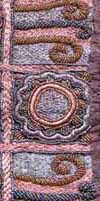10. THE BOER WAR
I must skip many other
experiences of the period between 1897 and 1899, and come straight to the
Boer War.
When the war was declared, my
personal sympathies were all with the Boers, but I believed then that I
had yet no right, in such cases, to enforce my individual convictions.
I have minutely dealt with the inner struggle regarding this in my history
of the Satyagraha in South Africa, and I must not repeat the argument here.
I invite the curious to turn to those pages. Suffice it to say that my
loyalty to the British rule drove me to participation with the British
in that war. I felt that if I demanded rights as a British citizen, it
was also my duty, as such, to participate in the defence of the British
Empire. I held then that India could achieve her complete emancipation
only within and through the British Empire. So I collected together as
many comrades as possible, and with very great difficulty got their services
accepted as an ambulance corps.
The average Englishman believed
that the Indian was a coward, incapable of taking risks or looking beyond
his immediate self-interest. Many English friends, therefore, threw cold
water on my plan. But Dr. Booth supported it whole-heartedly. He trained
us in ambulance work. We secured medical certificates of fitness for service.
Mr. Laughton and the late Mr. Escombe enthusiastically supported the plan,
and we applied at last for service at the front. The government thankfully
acknowledged our application, but said that our services were not then
needed.
I would not rest satisfied,
however, with this refusal. Through the introduction of Dr. Booth, I called
on the Bishop of Natal. There were many Christian Indians in our Corps.
The Bishop was delighted with my proposal, and promised to help us in getting
our services accepted.
Time too was working with us.
The Boer had shown more pluck, determination, and bravery than had been
expected; and our services were ultimately needed.
Our corps was 1,100 strong,
with nearly 40 leaders. About three hundred were free Indians, and the
rest indentured. Dr. Booth was also with us. The corps acquitted itself
well. Though our work was to be outside the firing line, and though we
had the protection of the Red Cross, we were asked at a critical moment
to serve within the firing line. The reservation had not been of our seeking.
The authorities did not want us to be within the range of fire. The situation,
however, was changed after the repulse at Spion Kop, and General Buller
sent the message that, though we were not bound to take the risk, Government
would be thankful if we would do so, and fetch the wounded from the field.
We had no hesitation, and so the action at Spion Kop found us working within
the firing line. During these days we had to march from twenty to twenty-five
miles a day, bearing the wounded on stretchers. Amongst the wounded we
had the honour of carrying soldiers like General Woodgate.
The corps was disbanded after
six weeks' service. After the reverses at Spion Kop and Vaalkranz, the
British Commander-in-Chief abandoned the attempt to relieve Ladysmith and
other places by summary procedure, and decided to proceed slowly, awaiting
reinforcements from England and India.
Our humble work was at the moment
much applauded, and the Indians' prestige was enhanced. The newspapers
published laudatory rhymes with the refrain, 'We are sons of Empire after
all.'
General Buller mentioned with
appreciation the work of the corps in his despatch, and the leaders were
awarded the War Medal.
The Indian community became
better organized. I got into closer touch with the indentured Indians.
There came a greater awakening amongst them, and the feeling that Hindus,
Musalmans, Christians, Tamilians, Gujaratis, and Sindhis were all Indians
and children of the same motherland took deep root amongst them. Everyone
believed that the Indians' grievances were now sure to be redressed. At
the moment the white man's attitude seemed to be distinctly changed. The
relations formed with the whites during the war were of the sweetest. We
had come in contact with thousands of tommies. They were friendly with
us and thankful for [our] being there to serve them.
I cannot forbear from recording
a sweet reminiscence of how human nature shows itself at its best in moments
of trial. We were marching towards Chievely Camp where Lieutenant Roberts,
the son of Lord Roberts, had received a mortal wound. Our corps had the
honour of carrying the body from the field. It was a sultry day--the day
of our march. Everyone was thirsting for water. There was a tiny brook
on the way where we could slake our thirst. But who was to drink first?
We had proposed to come in after the tommies had finished. But they would
not begin first and urged us to do so, and for a while a pleasant competition
went on for giving precedence to one another.

